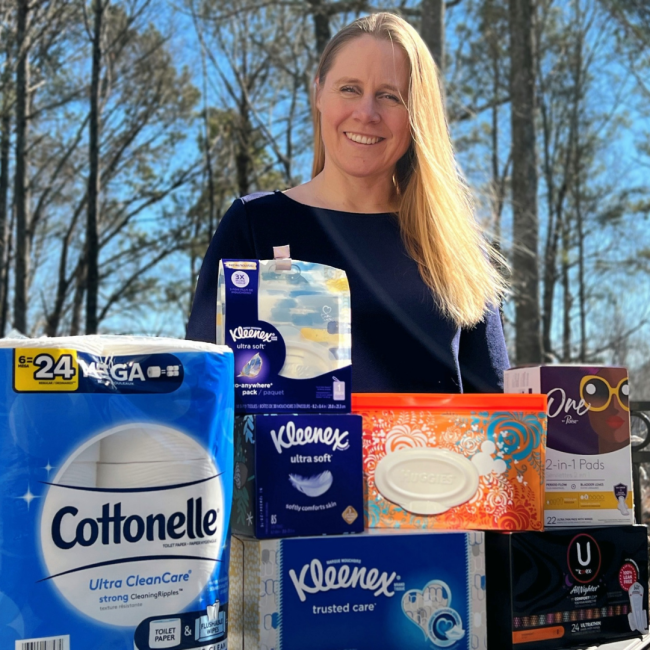
Lori Shaffer, the vice president of Kimberly-Clark’s global nonwovens business and a mother of three young children, is a mechanical engineer who has devoted her career to driving sustainability through materials science and delivering better care for people at every stage of their lives through the essential products that the company makes.
A 21-year veteran of Kimberly-Clark, Shaffer is passionate about encouraging more women to pursue science, technology, engineering and math (STEM) careers. We sat down with her to discuss the importance of attracting and retaining women in STEM careers, highlights from her own journey thus far, and why Wonder Woman inspires her on a daily basis.
Q: What first piqued your interest in science and engineering?
LS: My parents played a key role in this. My dad is a mechanical engineer, and we did all kinds of projects together when I was a kid, including tearing apart engines and rebuilding cars. It gave me that sense of accomplishment. My mom is a teacher who inspired my love of learning. So, it was a combination of seeing what an engineer does on the problem-solving side and my mom instilling the knowledge that there’s always an answer — you just have to go find it.
Q: Why did you decide to join Kimberly-Clark?
LS: When I graduated from Purdue University in 2000, I had 10 job offers, and I visited most of the companies that had open positions. I immediately noticed something different about Kimberly-Clark. The people were so warm and inviting and willing to share their experiences.
Every single person said the culture was what they liked most about the company. When people talked about the innovation that Kimberly-Clark was driving and how to do it sustainably, I remember thinking, this is a big agenda. The incredible caring value and the company’s commitment to always doing the right thing for consumers, the communities where we live and work, and for the planet that we all share is why I’ve stayed here for my entire career.
Q: Why is it important for more women to pursue careers in STEM?
LS: Problem solving is at the center of science, technology, engineering and math (STEM), and my experience has been that women do this differently than men. Women tend to lead with empathy and put the person at the center versus the technical, tactical sides. They ask, ‘How does the customer interact with this product? What problem are we trying to solve for them?’
The more women who join STEM fields — not just at Kimberly-Clark, but broadly — the more unique perspectives we can convene at the table to drive efficient and effective problem solving to address some of humanity’s most pressing problems.
Q: As a mother yourself, why are you passionate about encouraging mothers to stay in STEM careers?
LS: It’s so important because children look up to and emulate their parents. I want to see more women in STEM feeling empowered that they can have a healthy, thriving family and a fulfilling career. To support them, it’s important to connect them with women who have gone down that path. When you see people who look like you in these executive positions, it’s easier to envision yourself getting there. Helping to build that network is a key piece of making sure they stay.
Q: What would you tell women and girls who are considering a STEM career?
LS: Step back and think about your motivation, and do what you love. If the challenges facing our global community hurt your heart and are something you want to solve, STEM is a great place to be because there are a lot of different areas to pursue.
When that motivation is pure and authentic, you’re more likely to succeed – as opposed to pursuing a career field because you think you’ll make good money, and you kind of like science and math. When you do something you love and have an opportunity to make a positive impact, it won’t feel like work, and you’ll naturally excel.
Q: What are some of the challenges that women in STEM face?
LS: In certain STEM fields, where women are under-represented, it can be a challenge to build credibility – particularly for young women with less experience. You must advocate for yourself, speak up, and be confident in your expertise and ability to contribute in a meaningful way. Doing this consistently builds credibility for all women in STEM and opens the door for young women coming behind.
Q: What’s the key to your success?
LS: I owe so much of my success to the people around me who propped me up and advocated for me, so my hope is to be able to do the same for other young women and girls in STEM. If you see people struggling, help them. If we collectively made more of an effort to lift women up and support them, more women would stay in STEM careers.
Q: What has been the highlight of your career thus far?
LS: The highlight was my international experience working remotely in Nuremberg, Germany after moving there for my husband’s career. This was before remote working was common. As the sustainability marketing manager for Europe, the Middle East and Asia, I shared our strategy with consumers, helped design our products in a more sustainable way, and educated our customers on sustainable solutions for their businesses.
I had ultimate flexibility to reach into the organization and do the things that I felt would drive the most value. I had this unique opportunity to create a business almost on my own – while working from home and taking care of my kids – and create a lasting impact.
Q: How has motherhood impacted your career?
LS: Being a mom to three children has taught me that our actions speak louder than words, and that there is always somebody watching and learning from us. You have this opportunity every time you show up at work to positively impact the lives of others, so be intentional, and do what you say you are going to do. Work and life intersect in so many ways.
Q: What advice do you wish you had received as a child?
LS: I’ve always been very driven and competitive, but I wish someone had reminded me to always be kind to myself. You’re not measured by what you do or what you accomplish – you’re measured by your character and who you are as a person. Enjoy the people around you, be in tune with the things you love, and ensure the decisions you’re making every day are in line with your core values. If you make a mistake, offer yourself grace, because we tend to offer others grace more often than we do ourselves.
Q: What inspires you on an ongoing basis?
LS: My children serve as my main source of inspiration. They face challenges that I never could have imagined growing up, including the pressures of social media, cyber bullying, hyper competition, the threat of school shootings, the COVID-19 pandemic, virtual education, and more. Their incredible resilience reminds me daily what it means to love, forgive and show grace.
I know that I mess up as a mom sometimes, and my children have this uncanny ability to say, ‘I see you for who you are, and I still love you for who you are.’ If adults did this, we might have a different kind of world.
This might sound funny, but my second source of inspiration is Wonder Woman. She is a warrior, brave and confident, and that really resonates with me. Some days as I transition among my many hats from executive to wife to mother and back again, it feels like a battle to get everything done – and do it all well. Sometimes I think, what would Wonder Woman do? She inspires me to fight through on those tough days.
Q: Do you have a life mantra?
LS: I always remind myself of Maya Angelou’s quote – ‘People will forget what you said, and people will forget what you did, but they will never forget how you made them feel.’ It’s a mantra that I live by as a leader. It’s putting people at the center and stopping to think about their motivation and what they are trying to accomplish. How can I help them?
If everybody in the world did that, we would live in a completely different environment that is ultimately more caring, compassionate and productive for us all.



